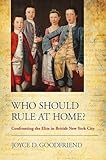Who Should Rule at Home? : Confronting the Elite in British New York City / Joyce D. Goodfriend.
Material type: TextPublisher: Ithaca, NY : Cornell University Press, [2017]Copyright date: ©2017Description: 1 online resource (312 p.) : 14 b&w halftonesContent type:
TextPublisher: Ithaca, NY : Cornell University Press, [2017]Copyright date: ©2017Description: 1 online resource (312 p.) : 14 b&w halftonesContent type: - 9781501708046
- British -- New York (State) -- New York -- History -- 18th century
- Early American & Colonial History
- New York History
- Political Science & Political History
- U.S. HISTORY
- HISTORY / United States / State & Local / Middle Atlantic (DC, DE, MD, NJ, NY, PA)
- slavery in nyc, religious pluralism in seventeenth and eighteenth-century new york city, elites and cultural authority, dutch new york, african americans in early new york city
- 974.7/02
- F128.4
- online - DeGruyter
| Item type | Current library | Call number | URL | Status | Notes | Barcode | |
|---|---|---|---|---|---|---|---|
 eBook
eBook
|
Biblioteca "Angelicum" Pont. Univ. S.Tommaso d'Aquino Nuvola online | online - DeGruyter (Browse shelf(Opens below)) | Online access | Not for loan (Accesso limitato) | Accesso per gli utenti autorizzati / Access for authorized users | (dgr)9781501708046 |
Browsing Biblioteca "Angelicum" Pont. Univ. S.Tommaso d'Aquino shelves, Shelving location: Nuvola online Close shelf browser (Hides shelf browser)

|

|

|

|

|

|

|
||
| online - DeGruyter Knowledge and the Ends of Empire : Kazak Intermediaries and Russian Rule on the Steppe, 1731-1917 / | online - DeGruyter Informal Workers and Collective Action : A Global Perspective / | online - DeGruyter I Am Where I Come From : Native American College Students and Graduates Tell Their Life Stories / | online - DeGruyter Who Should Rule at Home? : Confronting the Elite in British New York City / | online - DeGruyter The City Is the Factory : New Solidarities and Spatial Strategies in an Urban Age / | online - DeGruyter Suburb : Planning Politics and the Public Interest / | online - DeGruyter Everyday Law in Russia / |
Frontmatter -- Contents -- Preface -- Introduction: The Pan-ethnic Elite and the Problem of Cultural Authority -- Part One: The Indigestible Dutch -- 1. The Crystallization of an Anti-Dutch Narrative -- 2. From Nation to Linguistic Community -- Part Two: Pious Commoners -- 3. George Whitefield Awakens New York City -- 4. Becoming Religious Consumers -- Part Three: Defiant Dependents -- 5. “Master of the House”? -- 6. Attached to the Household -- 7. Sabotaging the Civilizers -- Conclusion: Tipping the Cultural Scales -- Notes -- Index
restricted access online access with authorization star
http://purl.org/coar/access_right/c_16ec
In Who Should Rule at Home? Joyce D. Goodfriend argues that the high-ranking gentlemen who figure so prominently in most accounts of New York City's evolution from 1664, when the English captured the small Dutch outpost of New Amsterdam, to the eve of American independence in 1776 were far from invincible and that the degree of cultural power they held has been exaggerated. The urban elite experienced challenges to its cultural authority at different times, from different groups, and in a variety of settings. Goodfriend illuminates the conflicts that pitted the privileged few against the socially anonymous many who mobilized their modest resources to creatively resist domination. Critics of orthodox religious practice took to heart the message of spiritual rebirth brought to New York City by the famed evangelist George Whitefield and were empowered to make independent religious choices. Wives deserted husbands and took charge of their own futures. Indentured servants complained or simply ran away. Enslaved women and men carved out spaces where they could control their own lives and salvage their dignity. Impoverished individuals, including prostitutes, chose not to bow to the dictates of the elite, even though it meant being cut off from the sources of charity. Among those who confronted the elite were descendants of the early Dutch settlers; by clinging to their native language and traditional faith they preserved a crucial sense of autonomy.
Mode of access: Internet via World Wide Web.
In English.
Description based on online resource; title from PDF title page (publisher's Web site, viewed 26. Apr 2024)


